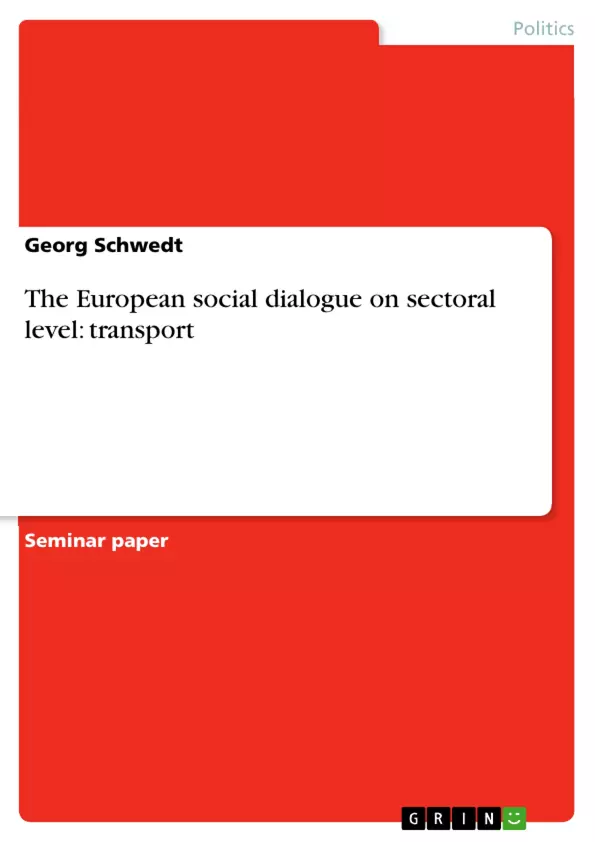This essay highlights important developments in the European social dialogue in the transport sector. Moreover it assesses the value of the European social dialogue for this sector.
First there is an overview over the transport sector in the EU and its social dialogues.
Then it focusses in more detail on maritime transport and civil aviation, where the most significant outcomes can be observed.
Inhaltsverzeichnis (Table of Contents)
- Introduction
- Characteristics of the transport sector
- Maritime transport and civil aviation
- Maritime transport
- The branch
- Actors in the social dialogue
- Outcomes of the social dialogue and future prospects
- Civil aviation
- The branch
- Actors in the social dialogue
- Outcomes of the social dialogue and future prospects
- Maritime transport
- Assessment of the value of the Social Dialogue for the transport sector
Zielsetzung und Themenschwerpunkte (Objectives and Key Themes)
This essay aims to examine significant developments within the European social dialogue in the transport sector. It will analyze the value of this dialogue for the sector and provide an assessment of its impact.
- The European social dialogue in the transport sector
- Characteristics of the transport sector
- Maritime transport and civil aviation
- The value of the social dialogue in the transport sector
- The impact of European legislation on employment and working conditions in the transport sector
Zusammenfassung der Kapitel (Chapter Summaries)
- Introduction: This chapter introduces the topic of the essay, outlining its objectives and the scope of its analysis. It provides an overview of the transport sector in the EU, its social dialogues, and its focus on maritime transport and civil aviation.
- Characteristics of the transport sector: This chapter provides an overview of the transport sector in the EU, including its five branches: civil aviation, inland waterways, maritime transport, railways, and road transport. It highlights the sector's role in EU employment, the exclusion of transport branches from the working time directive, and the EU's legislative involvement in the sector. The chapter also discusses the historical development of social dialogue committees in the transport sector and the challenges posed by EU enlargement.
- Maritime transport and civil aviation: This chapter focuses on two specific branches of the transport sector – maritime transport and civil aviation – where the social dialogue has had significant outcomes. It examines the characteristics of each branch, the actors involved in the social dialogue, and the key outcomes and future prospects.
Schlüsselwörter (Keywords)
The essay explores the European social dialogue in the transport sector, focusing on maritime transport and civil aviation. Key themes include the impact of EU legislation on employment and working conditions, the role of social dialogue committees, the challenges of EU enlargement, and the importance of skilled labor force recruitment and training. Important concepts include the European Transport Workers' Federation (ETF), the European Community Shipowner's Association (ECSA), and the International Labour Organisation's (ILO) Convention on seafarer's hours of work.
Frequently Asked Questions
What is the focus of the European social dialogue in the transport sector?
The focus is on improving employment and working conditions through dialogue between actors in branches like civil aviation and maritime transport.
Which transport branches are part of the EU social dialogue?
The sector includes five branches: civil aviation, inland waterways, maritime transport, railways, and road transport.
What are the most significant outcomes in maritime transport?
Significant outcomes include agreements on working time and the implementation of international labor standards (ILO conventions).
Who are the main actors in the social dialogue?
Key actors include the European Transport Workers' Federation (ETF) and employer associations like the European Community Shipowners' Association (ECSA).
How did EU enlargement affect the transport sector?
Enlargement posed challenges for coordinating social standards and managing a more diverse workforce across different member states.
- Quote paper
- Georg Schwedt (Author), 2003, The European social dialogue on sectoral level: transport, Munich, GRIN Verlag, https://www.grin.com/document/54541



